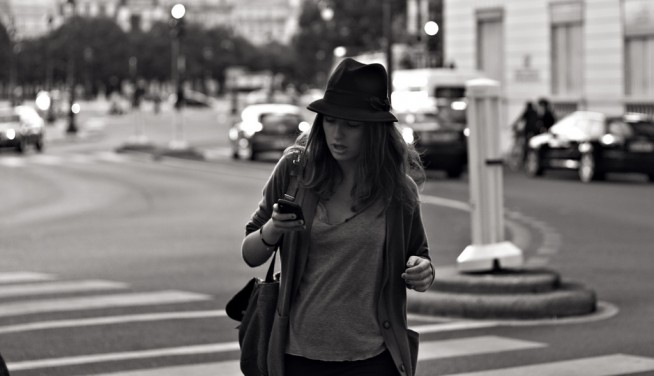A Pew Research Center report released earlier this month on social media use and stress has gotten a lot of play in subsequent media coverage, with recent headlines even happily declaring that “using Facebook and Twitter a lot can actually decrease stress.” Wishful thinking. Pew surveyed the associations between people’s self-reported social media use and how stressful they perceive their lives to be, but it did not attempt to determine how Internet and social media use affects stress levels.
The Pew report did find that “women who use Twitter, email and cellphone picture sharing report lower levels of stress.” But we have no idea if there is a cause-and-effect relationship. Perhaps the low-stress women Pew surveyed have more leisure time, which both lowers how stressful they perceive their lives to be, and also gives them more time to send their friends pictures from their smartphones, and to post to Twitter. Or perhaps these women were feeling the positive effects of communicating with friends.
Indeed, one of the most consistent findings in the last 150 years from psychology and sociology is that a person’s well-being is best predicted by the breadth and depth of their social ties. Knowing this, we can ask how social media can strengthen our real-life relationships.
Perhaps sending your sister photos makes you feel closer to her, especially when she comments and sends photos of her own in return. Plenty of research would back up the notion that the love and closeness you feel during this picture exchange really could lower your stress in a measurable way. Many people report a similar positive effect from posting on Facebook. Likewise reading an article posted to Twitter that makes you feel engaged and curious, or viewing a particular artist’s photos on Instagram that inspires you. These are all instances where social media can foster positive emotions–and positive emotions reduce stress, help us relax, give us energy, and lend our lives meaning and fulfillment.
On the other hand, you might notice that your email or social media use is making you feel bad about yourself. Comparing ourselves to others, while natural, can make us feel envious and unhappy.
Does social media use make you feel like you aren’t measuring up? @RaisingHappines
(Click to Tweet!)
Or does it make you feel isolated? Neither of these feelings will make your life better. And, as so many people know, constantly checking email or feedback status throughout the day can exacerbate your stress. When researchers Elizabeth Dunn and Kostadin Kushlev regulated how frequently research participants checked their email, for example, those limited to checking their email only three times a day (vs. an average of fifteen times) were less tense and less stressed overall.
Social media does have the power to make us miserable and stressed out–or to help us feel love and connection, joy and gratitude, inspiration and curiosity. The key is to understand how these technologies influence our emotional lives, and learn to use them strategically.
To reap the benefits of electronic connection, try these three strategies today:
- Check email strategically, not constantly. Designate three specific times today that you’ll read and respond to your email, and keep your mail application closed (and alerts off) at all other times.
- Decide on a few places where you will ban your smartphone use. (Consider starting with the dining room table, your bed, and the bathroom.) If you don’t have your phone in the same room, you’ll be a lot less tempted to check it.
- Use social media and email to strengthen your real-life relationships. Each morning, send an email telling someone what you really appreciate about them.
Best known for her weekly Happiness Tips, Christine Carter, Ph.D., draws on psychology, sociology, and neuroscience, and uses her own real-world adventures to demonstrate happiness dos and don’ts in action. Dr. Carter is a sociologist at UC Berkeley’s Greater Good Science Center, and the author of The Sweet Spot: How to Find Your Groove at Home and Work (January 2015) RAISING HAPPINESS: 10 Simple Steps for More Joyful Kids and Happier Parents. She teaches happiness classes online throughout the year to a global audience on her website www.christinecarter.com.
Need more structure? This is a pretty hardcore Happiness Tip (usually they are much less dramatic.) If you want more support in making a change like this one, please sign up for my free online class. You’ll get a worksheet and an email everyday for twenty-one days that will give you more help establishing good habits like this one.
Image courtesy of Bruno.












